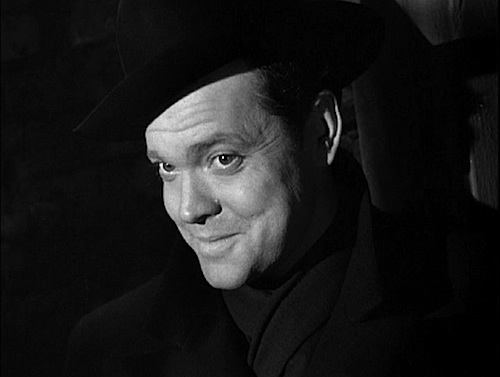Watch Preview on PBS. See more from Dangerous Edge: A Life of Graham Greene.
By Joe Bendel. During his tenure with the British intelligence, Graham Greene reported directly to the notorious Soviet mole Kim Philby. It was rather fitting the espionage novelist and chronic adulterer would be so closely associated with such a significant betrayer. Yet, Greene consistently offered tortured defenses of his friend. He was “complicated” that way. Thomas P. O’Connor surveys the writer’s work and ironic life in Dangerous Edge: A Life of Graham Greene, which airs this Friday night on most PBS outlets.
Greene was never awarded the Nobel Prize for Literature, but he was nominated for an Oscar. Indeed, with so many of Greene’s books and screenplays produced for the big screen, O’Connor has a wealth of cinematic imagery available to illustrate Greene’s oeuvre, without ever scraping the bottom of the barrel. In fact, at least two of Greene’s scripts became outright masterpieces: The Third Man and Fallen Idol, both directed by Carol Reed.

Essentially, O’Connor focuses on three sides of Greene’s persona: the writer, the adventurer, and the adulterous, spiritually doubting manic depressive. Much is made of Greene’s persistent “boredom,” his euphemism for depression, as well as his conversion to a decidedly flawed but earnest brand of Catholicism. Greene’s biographers point to Greene’s reluctant status as the preeminent “Catholic novelist” of his time, while rather openly carrying-on with a woman who was not his wife, as one of the many great contradictions defining his life. Fair enough.
O’Connor incorporates talking head interviews with some top shelf literary figures, including Sir John Mortimer, Paul Theroux, David Lodge, and John Le Carré, who (quite surprisingly) blasts Philby for coldly and deliberately causing the deaths of numerous colleagues. Again, O’Connor was fortunate to have considerable audio recordings of Greene, sounding like quite the acidic raconteur. Bill Nighy also serves as the supplemental voice of the author, reading his letters and documents when the archival Greene is not available. It is a rather classy package, narrated by Sir Derek Jacobi.
Aside from Le Carré, Edge’s participants largely give Greene a pass on Philby and related Cold War issues. Great pains are taken to portray him as an equal opportunity geopolitical gadfly, but it is far from convincing. Nonetheless, the complexity of Greene’s relationship to his Catholic faith should interest readers and viewers across the spectrum. A well paced examination of a flawed but fascinating figure, Dangerous Edge follows Philip Roth: Unmasked (another unsuccessful Nobel contender, thus far), this Friday (3/29) on PBS stations nationwide.
LFM GRADE: B-
Posted on March 26th, 2013 at 11:17am.